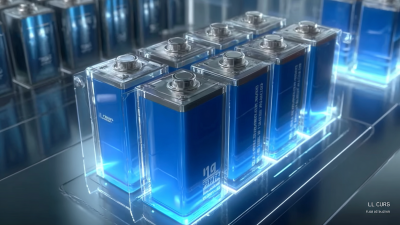5 Unexpected Benefits of Lithium Battery Storage You Need to Know
In an era where sustainable energy solutions are increasingly vital, Lithium Battery Storage has emerged as a game-changer for both individuals and businesses alike. While many are aware of the primary benefits, such as efficiency and longevity, there are several unexpected advantages that often go unnoticed. This blog delves into five surprising benefits of Lithium Battery Storage that can enhance energy management and contribute to a greener environment. By exploring these lesser-known aspects, we aim to provide valuable insights that will inspire readers to consider how Lithium Battery Storage can be an integral part of their energy solutions, ultimately paving the way for a more sustainable future. Whether you're a homeowner looking to reduce your carbon footprint or a business seeking reliable energy storage, understanding these benefits is essential in making informed decisions.

The Future of Energy: How Lithium Batteries are Reshaping Storage Solutions
The future of energy is undeniably being shaped by lithium battery technology, particularly as the demand for electric vehicles (EVs) continues to surge. According to a recent report by the International Energy Agency, global sales of electric vehicles are forecasted to reach 23 million units per year by 2030, representing a significant shift away from traditional internal combustion engines. This transition significantly reduces greenhouse gas emissions, highlighting the environmental benefits of adopting lithium battery systems for energy storage and transportation.
Moreover, advancements in lithium battery technology are not limited to electric vehicles. Innovations such as redox flow batteries offer promising solutions for sustainable energy storage, enabling the efficient desalination of seawater while simultaneously harnessing renewable energy sources. These batteries are projected to have a market growth rate exceeding 25% annually, driven by their ability to store large amounts of energy and release it as needed, complementing intermittent renewable sources like solar and wind power. As the transition to greener energy sources accelerates, lithium batteries and their associated technologies will play a pivotal role in reshaping storage solutions and promoting sustainable practices across industries.

Unraveling Efficiency: The Cost-Effectiveness of Lithium Battery Systems
Lithium battery systems are gaining attention not only for their energy capacity but also for their cost-effectiveness as the world shifts towards renewable energy sources. The lithium-ion battery market is projected to exceed $75.2 billion by 2024, with a compound annual growth rate of 15.8% expected from 2025 to 2034. This remarkable growth is driven by the increasing demand for electric vehicles and renewable energy storage solutions, highlighting how lithium battery technology can efficiently store energy for varied applications.
Moreover, advancements in battery management systems and manufacturing processes are enhancing the overall efficiency and longevity of these storage units. With companies investing heavily in innovative electric vehicle platforms and cutting-edge battery technologies, the effectiveness of lithium batteries in delivering reliable energy storage solutions becomes ever clearer. This efficiency not only supports green initiatives but also proves to be a financially sound investment for energy-intensive industries and consumers alike, paving the way for a sustainable energy future.
5 Unexpected Benefits of Lithium Battery Storage
This chart illustrates the cost-effectiveness of lithium battery systems based on various benefits.
Space-Saving Innovations: Maximizing Your Area with Compact Lithium Storage
In today's fast-paced world, space-saving innovations are more crucial than ever, especially when it comes to energy storage solutions like lithium battery technology. These compact powerhouses not only streamline energy management but also offer remarkable efficiency. By optimizing vertical and horizontal storage in residential and commercial spaces, lithium batteries help maximize area while maintaining high energy output. This aspect is particularly valuable in urban environments where every square foot counts.
Furthermore, as the global demand for renewable energy integration grows, lithium battery storage plays a vital role in addressing current challenges faced by hybrid renewable energy systems. The synergy between solar and wind technologies can be significantly enhanced by effective energy storage. By facilitating optimal scheduling and energy distribution, lithium systems contribute to the decarbonization efforts needed for sustainable development. Their compact nature allows for seamless integration into existing infrastructure, paving the way for innovative strategies that prioritize environmental sustainability while efficiently utilizing available space.

Eco-Friendly Energy: The Environmental Benefits of Lithium Battery Use
The increasing reliance on lithium battery storage systems is revolutionizing the way we think about energy consumption and environmental impact. One of the standout benefits is their substantial contribution to reducing greenhouse gas emissions. According to a report from the International Energy Agency (IEA), utilizing lithium-ion batteries can lead to a decrease of up to 30% in emissions compared to traditional fossil fuel sources when used in renewable energy applications. This shift not only addresses climate goals but also enhances air quality in urban areas.
Tips for optimizing the use of lithium batteries include managing charging cycles effectively to prolong lifespan and efficiency. Keeping batteries charged between 20% and 80% can notably enhance their longevity, making them a more sustainable option in the long term. Furthermore, manufacturers are increasingly adopting recycling practices, with data from the Global Battery Alliance indicating that up to 95% of lithium battery materials can be reclaimed, significantly minimizing waste and encouraging a circular economy.
The shift towards lithium battery storage also promotes a more resilient energy grid. With advancements in technology leading to better energy density and efficiency, systems powered by lithium batteries can better manage intermittent renewable energy sources, fostering a more stable and sustainable energy infrastructure. This adaptability is crucial as we move toward a cleaner energy future.
Enhanced Power Reliability: Ensuring Consistent Energy Availability with Lithium Solutions
Lithium battery storage offers enhanced power reliability, making it an increasingly popular choice for both residential and commercial energy solutions. Unlike traditional battery systems, lithium batteries provide a consistent and efficient energy supply, allowing users to rely on a steady flow of power, even during peak demand periods or outages. This reliability not only supports daily operations but also gives peace of mind to those who depend on critical systems that require uninterrupted energy.
When considering lithium battery storage, it’s crucial to invest in a quality battery management system (BMS). A well-designed BMS optimizes charging and discharging processes, ensuring longevity and performance of the battery pack. Additionally, users should regularly monitor the state of charge and health of their batteries to preemptively identify potential issues.
Another tip is to integrate renewable energy sources, such as solar panels, with lithium battery systems. This combination maximizes energy efficiency and reduces reliance on grid power, further enhancing energy availability during outages. By coupling lithium storage with renewables, users not only improve sustainability but also contribute to a more stable energy future.
5 Unexpected Benefits of Lithium Battery Storage You Need to Know - Enhanced Power Reliability: Ensuring Consistent Energy Availability with Lithium Solutions
| Benefit | Description | Impact | Example Use Case |
|---|---|---|---|
| Enhanced Energy Efficiency | Lithium batteries have higher energy density, resulting in less energy loss during storage. | Reduced energy costs and improved operational efficiency. | Commercial buildings using lithium storage for peak shaving. |
| Longer Lifespan | Lithium batteries typically last longer than lead-acid batteries, leading to lower replacement costs. | Lower maintenance and capital expenditure. | Residential solar systems with lithium battery storage. |
| Rapid Charging Capabilities | Lithium batteries charge faster than traditional batteries, ensuring quicker energy availability. | Minimized downtime during charging periods. | Electric vehicles benefitting from fast charging stations. |
| Weight Advantage | Lithium batteries are significantly lighter than other types, reducing overall system weight. | Flexibility in system design and easier transportation. | Portable power banks for outdoor events. |
| Environmental Benefits | Lithium batteries generally have fewer toxic materials and are more recyclable. | Contributes to sustainability and environmental protection. | Renewable energy storage solutions in green buildings. |
Related Posts
-

Connecting Solar Battery Innovations with Global Buyers at the Record-Breaking 137th Canton Fair
-

7 Essential Features to Consider for the Best Solar System Batteries in 2023
-

Unlocking Performance: In-Depth Technical Specifications of the Best Lithium Ion Solar Battery
-

Explore the Top Choices for Best Solar System Batteries in 2023
-

Future Trends in Solar Lithium Battery Technology by 2025 and Its Advantages for Renewable Energy Solutions
-

Unmatched Quality in Global Lithium Pro Batteries from China's Premier Manufacturer
